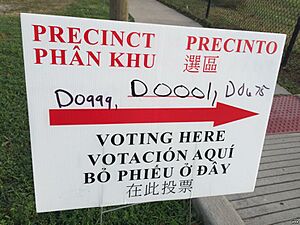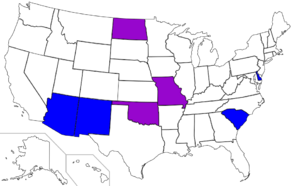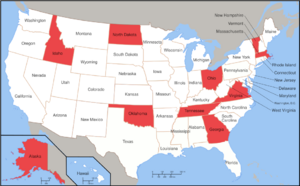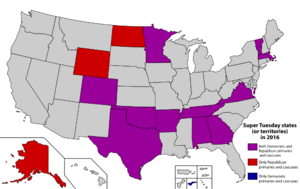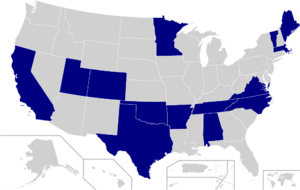Super Tuesday facts for kids
Quick facts for kids Super Tuesday |
|
|---|---|
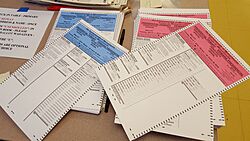
Republican and Democratic party ballots in a Massachusetts polling location, 2016
|
|
| Nickname | Primary Day |
| Status | Active |
| Date(s) | Varies |
| Frequency | Every four years |
| Country | United States |
| Inaugurated | c.1984 |
| Previous event | 2024 Presidential primaries |
| Next event | 2028 Presidential primaries |
| Participants | Presumptive Democratic and Republican presidential nominees |
| Activity | Voting |
Super Tuesday is a special day during the U.S. presidential primary elections. It happens in February or March. On this day, the most U.S. states hold their primary elections and caucuses.
About one-third of all the delegates needed to choose a presidential candidate are decided on Super Tuesday. This is more than on any other single day. Because of this, the results on Super Tuesday often show who will likely become the presidential candidate for each major political party.
The states that participate in Super Tuesday can change each time. This is because each state chooses its own election date. The name Super Tuesday has been used since at least 1976. It is an unofficial name used by news reporters and political experts.
Contents
How Presidential Candidates Are Chosen
In the United States, two main political parties, the Democratic Party and Republican Party, choose their presidential candidates. They do this at big meetings called nominating conventions. People called delegates from each state attend these conventions.
Each state decides how its delegates are chosen. This can be through a primary election or a caucus. States also pick the date for these contests. States often try to hold their elections earlier to have more influence in choosing the candidates.
Super Tuesday Through the Years
1984: The Start of Super Tuesday
The idea of Super Tuesday began in 1984. That year, there were three "Super Tuesdays." On the third one, five states voted. Walter Mondale was trying to win the Democratic nomination. He was expected to get enough delegates to win.
Another candidate, Gary Hart, made a mistake. He joked about New Jersey while campaigning in California. He said he had to hold "samples from a toxic waste dump" in New Jersey. Even though he was ahead in polls, he lost New Jersey. Mondale then secured the Democratic nomination.
1988: Southern States Vote Together
In the 1970s, southern states wanted to have more say in presidential elections. They decided to hold their primaries all at once. This was meant to help a conservative candidate from the South get a strong start.
Many southern states set their primary for the second Tuesday of March in 1988. This became a big Super Tuesday. Michael Dukakis, Dick Gephardt, Al Gore, and Jesse Jackson were major Democratic candidates. Jackson won the most southern delegates, followed by Gore. Dukakis won Florida and Texas.
For the Republicans, George H. W. Bush won almost all the states on Super Tuesday. This nearly guaranteed him the Republican nomination. Running a campaign across so many states was very expensive.
1990s: Key Wins for Candidates
1992: Bill Clinton's Rise
In 1992, Bill Clinton won several southern primaries on Super Tuesday. This helped him win the Democratic nomination and later become president.
| 1992 Democratic primaries | Bill Clinton | Paul Tsongas |
|---|---|---|
| Number of states won on Super Tuesday | 8 | 3 |
1996: Bob Dole's Nomination
In 1996, Super Tuesday was on March 12. Bob Dole won all the states that day. This helped him secure the Republican nomination. The sitting president, Bill Clinton, easily won the Democratic nomination.
2000s: Bigger and More States
2000: A Record-Breaking Day
Super Tuesday in 2000 was on March 7. Sixteen states held primaries, making it the largest primary election day at that time. Al Gore for the Democrats and George W. Bush for the Republicans won big. Their wins on Super Tuesday helped them become their parties' presidential candidates.
| 2000 Republican primaries | George W. Bush | John McCain |
|---|---|---|
| Number of states won on Super Tuesday | 9 | 4 |
2004: Mini-Tuesday and Super Tuesday II
In 2004, some states moved their elections to February 3. This day was called Mini-Tuesday. The traditional Super Tuesday was on March 2, and it was called Super Tuesday II. These days were important for the Democratic primaries. The Republican primaries were not contested because President George W. Bush was running for re-election.
| Democratic primaries | John Kerry | John Edwards | Wesley Clark | Howard Dean | Al Sharpton | Joe Lieberman | Dennis Kucinich |
|---|---|---|---|---|---|---|---|
| Number of states won on Mini-Tuesday | 6 | 1 | 1 | 0 | 0 | 0 | 0 |
| Number of delegates won on Mini-Tuesday | 155 | 56 | 50 | 11 | 1 | 0 | 0 |
2008: The Biggest Super Tuesday
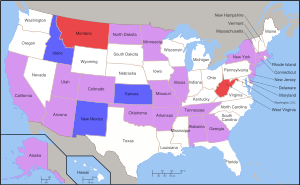
To make their votes more important, 24 states moved their primary dates to February 5, 2008. This created the largest "Super Tuesday" ever. News reporters called it "Giga Tuesday" or "Super Duper Tuesday" because it was so big.
Barack Obama and Hillary Clinton were the main Democratic candidates. Obama won 13 states, and Clinton won 10. For the Republicans, John McCain won 9 states, taking a big lead.
| Democratic primaries | Barack Obama | Hillary Clinton |
|---|---|---|
| Number of states won on Super Tuesday | 13 | 10 |
| Number of delegates won on Super Tuesday | 847 | 834 |
| Republican primaries | John McCain | Mitt Romney | Mike Huckabee | Ron Paul |
|---|---|---|---|---|
| Number of states won on Super Tuesday | 9 | 7 | 5 | 0 |
| Number of delegates won on Super Tuesday | 511 | 176 | 147 | 10 |
2010s: Modern Super Tuesdays
2012: Romney's Lead Grows
Super Tuesday in 2012 was on March 6. Ten states held Republican primaries. Mitt Romney had already won some important contests before this day. He won six states on Super Tuesday, which greatly increased his lead for the Republican nomination. President Barack Obama was running for re-election, so the Democratic primaries were not contested.
| Republican primaries | Mitt Romney | Rick Santorum | Newt Gingrich | Ron Paul |
|---|---|---|---|---|
| Number of states won on Super Tuesday | 6 | 3 | 1 | 0 |
| Number of delegates won on Super Tuesday (OH 4 unalloc.) | 225 | 89 | 80 | 21 |
2016: Two Super Tuesdays
Super Tuesday I
The first Super Tuesday in 2016 was on March 1. It was sometimes called the "SEC Primary" because many states from the Southeastern Conference (a college sports group) were involved.
Eleven states and three territories held contests. For Democrats, Hillary Clinton won seven states, and Bernie Sanders won four. For Republicans, Donald Trump won seven states, Ted Cruz won three, and Marco Rubio won one.
| Democratic primaries | Hillary Clinton | Bernie Sanders |
|---|---|---|
| Number of states won on Super Tuesday | 7 | 4 |
| Number of delegates won on Super Tuesday | 486 | 321 |
| Republican primaries | Donald Trump | Ted Cruz | Marco Rubio | John Kasich | Ben Carson |
|---|---|---|---|---|---|
| Number of states won on Super Tuesday | 7 | 3 | 1 | 0 | 0 |
| Number of delegates won on Super Tuesday | 256 | 219 | 101 | 21 | 3 |
Super Tuesday II
March 15, 2016, was called Super Tuesday II. Five states held both Democratic and Republican primaries. These Republican contests were important because they were the first to use a "winner-takes-all" system, meaning the candidate who won the state got all its delegates.
Hillary Clinton won all five states for the Democrats. Donald Trump won five states for the Republicans, and John Kasich won one.
| Democratic primaries | Hillary Clinton | Bernie Sanders |
|---|---|---|
| Number of states won on Super Tuesday II | 5 | 0 |
| Number of delegates won on Super Tuesday II | 347 | 246 |
| Republican primaries | Donald Trump | John Kasich | Ted Cruz | Marco Rubio |
|---|---|---|---|---|
| Number of contests won on Super Tuesday II | 5 | 1 | 0 | 0 |
| Number of delegates won on Super Tuesday II | 229 | 81 | 51 | 6 |
2020s: Recent Super Tuesdays
2020: A Big Day for Biden and Trump
Super Tuesday in 2020 was on March 3. Fourteen states and one territory held their presidential primaries or caucuses. This day decided a large number of delegates for the Democratic candidates. California and Texas, two of the biggest states, had many delegates available.
Joe Biden won ten states for the Democrats. Bernie Sanders won four states, including California. Michael Bloomberg won American Samoa.
For the Republicans, the sitting president, Donald Trump, easily won the primaries against his challenger, Bill Weld.
| Democratic primaries | Joe Biden | Bernie Sanders |
|---|---|---|
| Number of states won on Super Tuesday | 10 | 4 |
| Number of delegates won on Super Tuesday | 726 | 505 |
2024: The Latest Super Tuesday
Super Tuesday in 2024 happened on March 5. Many states held primaries and caucuses for both parties.
For the Republicans, Donald Trump won almost all the states. Nikki Haley won only Vermont.
For the Democrats, Joe Biden won nearly all the states. Jason Palmer won American Samoa.
| Donald Trump | Nikki Haley | Ref |
|---|---|---|
| Alabama Alaska Arkansas California Colorado Maine Massachusetts Minnesota North Carolina Oklahoma Tennessee Texas Utah Virginia |
Vermont |
| Joe Biden | Jason Palmer | Ref |
|---|---|---|
| Alabama Arkansas California Colorado Iowa Maine Massachusetts Minnesota North Carolina Oklahoma Tennessee Texas Utah Vermont Virginia |
American Samoa |
See also
 In Spanish: Supermartes para niños
In Spanish: Supermartes para niños
- List of Democratic Party presidential primaries
- List of Republican Party presidential primaries
Works cited
he:הבחירות המקדימות לנשיאות ארצות הברית#סופר טיוזדיי
 | Delilah Pierce |
 | Gordon Parks |
 | Augusta Savage |
 | Charles Ethan Porter |


